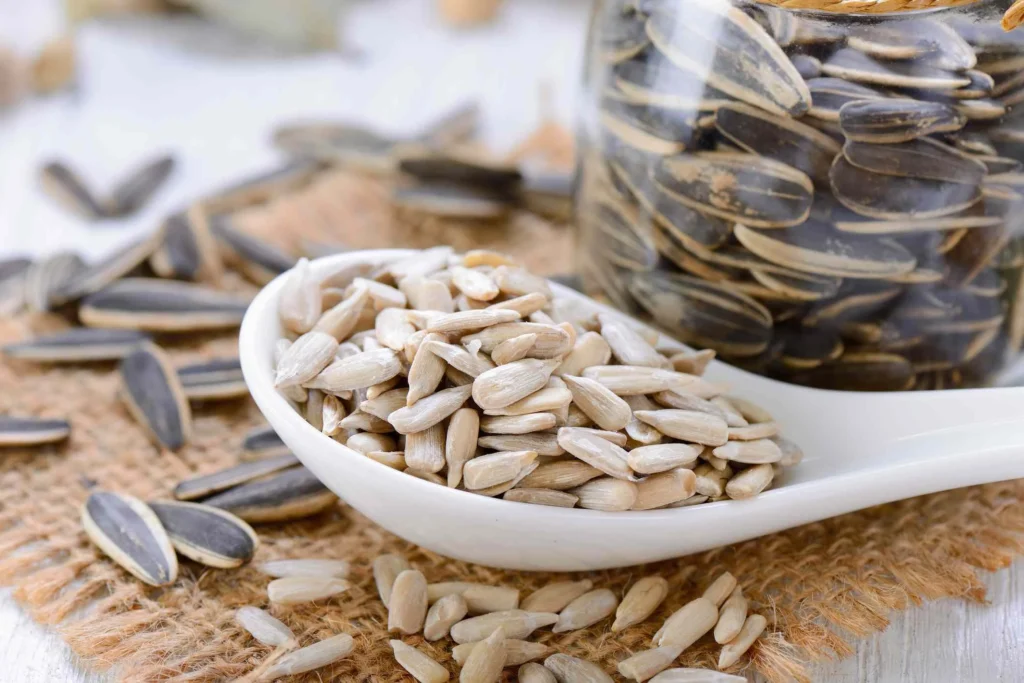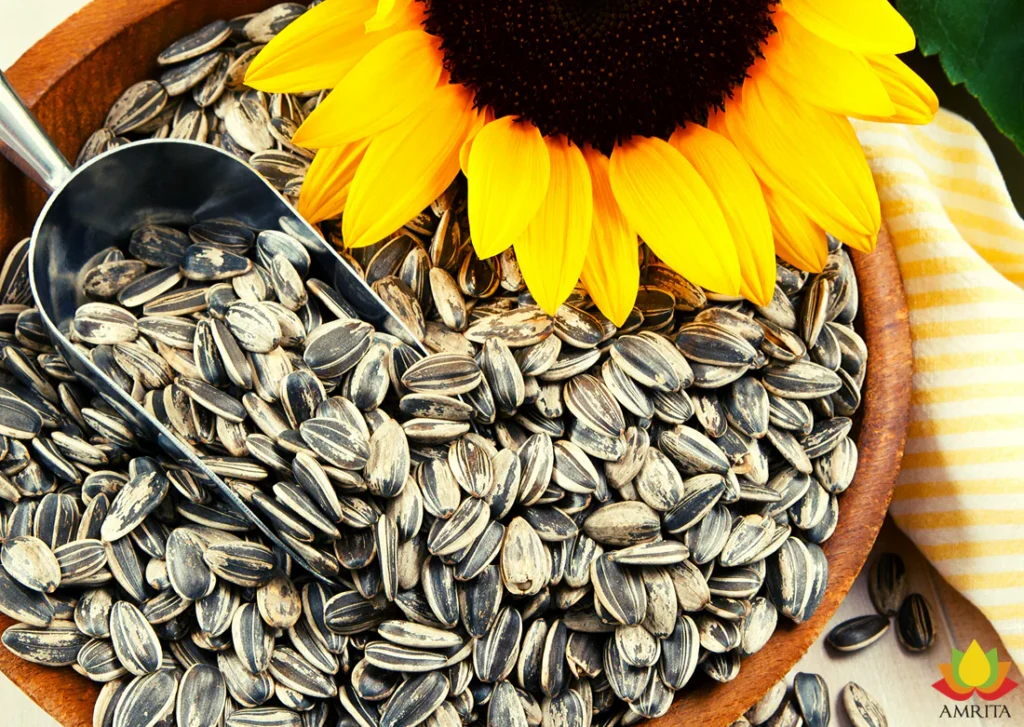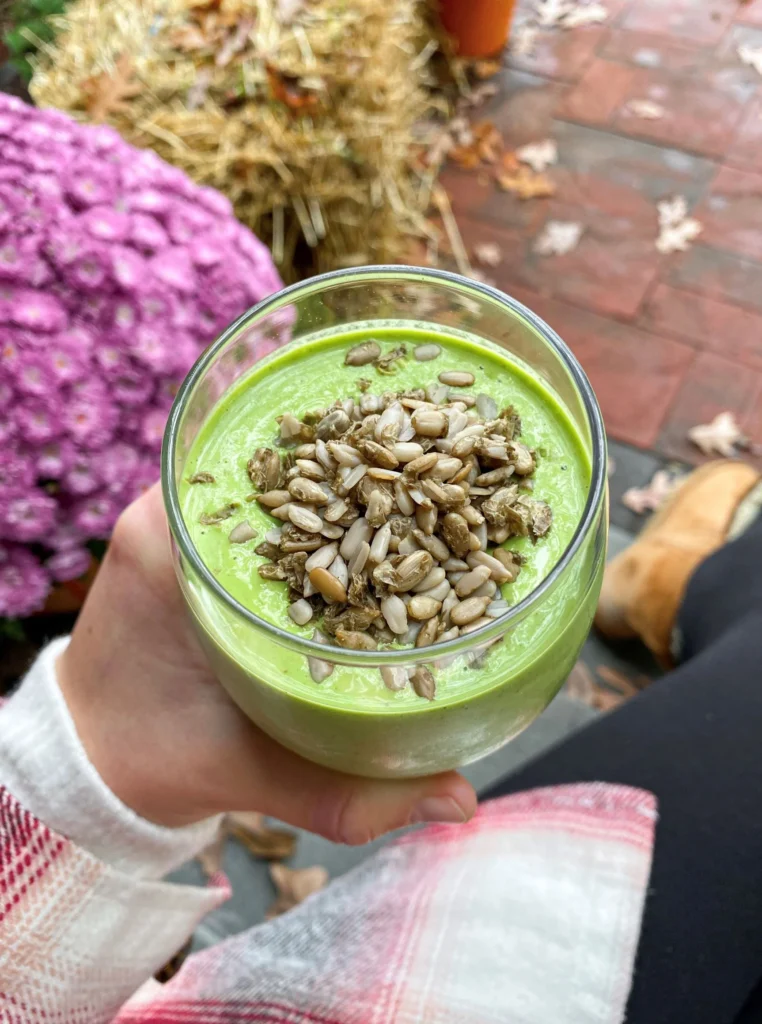Les graines de tournesol, que l'on trouve souvent dans les mélanges de fruits et légumes ou que l'on mange par poignées lors d'un match de football, sont un aliment de base à l'heure du goûter. Mais au-delà de leur croquant satisfaisant, elles constituent une source importante de protéines qui est souvent sous-estimée. Nous savons tous que les protéines sont essentielles à la réparation des muscles, à la satiété et à la santé en général, mais lorsqu'il s'agit de graines de tournesol, les vraies questions commencent à se poser.
Quelle est la quantité de protéines qu'ils contiennent ? vraiment ont-ils ? S'agit-il d'une protéine complète de haute qualité sur laquelle vous pouvez compter ? Et comment se comparent-elles à d'autres noix et graines populaires ?
Ce guide va au-delà de l'étiquette. Nous nous pencherons sur les données, nous aborderons les controverses (comme l'inflammation) et nous fournirons un verdict clair et scientifiquement fondé sur les protéines de graines de tournesol. Que vous soyez un adepte du fitness qui suit ses macros, un végétalien qui optimise son régime alimentaire ou simplement à la recherche d'un en-cas plus sain, vous trouverez ici toutes les réponses à vos questions.
Quelle est la teneur en protéines des graines de tournesol ? Une réponse étayée par des données
Allons droit au but. Les graines de tournesol sont une excellente source de protéines d'origine végétale. Bien que les chiffres puissent varier légèrement en fonction de la variété et de la préparation, les données fournissent une image claire de leur teneur en protéines.
Une norme portion de ¼ tasse (30 grammes) de graines de tournesol décortiquées donne environ 6 grammes de protéines. Cela en fait un complément puissant à tout repas ou en-cas, apportant un solide coup de pouce à votre apport quotidien en protéines.
Pour mettre les choses en perspective, voici une ventilation plus détaillée basée sur les données du ministère américain de l'agriculture (USDA) :
| Taille de la portion | Teneur en protéines (approximative) |
|---|---|
| 100 grammes (3,5 onces) | 21 grammes |
| ¼ tasse (30 grammes) | 6,3 grammes |
| 1 once (28 grammes) | 5,8 grammes |
À retenir : Pour leur petite taille, les graines de tournesol offrent une quantité substantielle de protéines, comparable gramme pour gramme à de nombreuses autres noix et graines. Mais la teneur en protéines n'est que la moitié de l'histoire. La question suivante est celle de la qualité.
Les protéines de tournesol sont-elles de haute qualité ? La question des acides aminés
Voici une information qui prête à confusion : les protéines de graines de tournesol sont techniquement des protéines "incomplètes". Mais qu'est-ce que cela signifie pour votre santé ?
Une protéine incomplète est une protéine pauvre en un ou plusieurs des neuf acides aminés essentiels que notre corps ne peut pas produire. Dans le cas des graines de tournesol, l'acide aminé limitant est le suivant lysine.
Pendant des années, cela a conduit au mythe selon lequel il fallait combiner des protéines incomplètes au niveau de l'estomac. même repas pour obtenir des avantages. Nous savons aujourd'hui que ce n'est pas vrai. Votre corps dispose d'une réserve d'acides aminés et, si vous consommez une variété de sources de protéines tout au long de la journée, vous pouvez facilement répondre à vos besoins.
La solution : Comment compléter facilement les protéines par des accords alimentaires
Faire des graines de tournesol une protéine "complète" dans votre alimentation est incroyablement simple. Il suffit de les associer à des aliments riches en lysine. C'est un travail d'équipe. Voici quelques combinaisons faciles à réaliser :
- Saupoudrez-les sur les légumineuses : Ajoutez une garniture croquante à une soupe de lentilles, à une salade de haricots noirs ou à votre houmous préféré.
- Mélanger avec le quinoa : Ajoutez-les à un bol de quinoa pour obtenir une texture fantastique et un profil complet d'acides aminés.
- A associer avec du tofu ou du tempeh : Une poignée de graines de tournesol accompagnant un sauté de tofu fait parfaitement l'affaire.
Comment les graines de tournesol se comparent-elles ? Une analyse tête à tête
Alors, comment les graines de tournesol se situent-elles par rapport aux autres titans du monde des fruits à coque et des graines ? Si l'on dépasse le simple nombre de protéines et que l'on analyse l'efficacité, les graines de tournesol se révèlent être un concurrent de taille.
Ils offrent des niveaux de protéines très compétitifs, une dose supérieure de vitamine E et, bien souvent, un avantage de coût significatif. Voyons les choses en détail.
Le tableau comparatif ultime
| Nutrient/Metric | Graines de tournesol (décortiquées) | Graines de citrouille (décortiquées) | Amandes (crues) |
|---|---|---|---|
| Protéines par 100g | ~21 g | ~30 g | ~21 g |
| Vitamine E par 100g | 234% DV | 14% DV | 171% DV |
| Magnésium par 100g | 77% DV | 141% DV | 64% DV |
| Protéines pour 100 calories | ~3.6 g | ~5.5 g | ~3.6 g |
| Coût estimé | $ (le plus abordable) | $$ (milieu de gamme) | $$$ (Premium) |
Le point de vue : Alors que les graines de courge gagnent en densité de protéines pures, les graines de tournesol sont à égalité avec les amandes et offrent une quantité phénoménale de vitamine E, un antioxydant dont de nombreuses personnes souffrent d'une carence. De plus, elles sont souvent l'option la plus économique, ce qui en fait un choix remarquablement efficace à la fois pour vos objectifs nutritionnels et pour votre portefeuille.
Le tableau complet : Les nutriments au service de la santé
La valeur des graines de tournesol va bien au-delà de leur teneur en protéines. Leur mélange unique de graisses saines, d'antioxydants et de minéraux essentiels offre des avantages tangibles pour la santé.
- Favorise la santé cardiaque : Elles sont riches en graisses monoinsaturées et polyinsaturées qui, selon l'American Heart Association, peuvent contribuer à réduire le taux de mauvais cholestérol et le risque de maladies cardiaques.
- Lutte contre l'inflammation et les dommages cellulaires : Une seule portion contient de la vitamine E, un puissant antioxydant liposoluble qui protège les cellules du stress oxydatif. Elles sont également une excellente source de sélénium, qui joue un rôle clé dans la réduction de l'inflammation.
- Favorise la solidité des os : La teneur impressionnante en magnésium est cruciale pour la structure et la densité des os.
À lire absolument : Aborder les risques et les controverses
Aucun aliment n'est parfait et il est important d'avoir une conversation équilibrée. Les graines de tournesol suscitent trois préoccupations communes. Voici ce que dit la science.
1. Le débat sur les oméga-6 et l'inflammation : Un point de vue équilibré
Les graines de tournesol sont riches en acide linoléique, une graisse polyinsaturée oméga-6. Vous avez peut-être entendu dire qu'une alimentation riche en oméga-6 et pauvre en oméga-3 peut être pro-inflammatoire. Il s'agit là d'une préoccupation légitime, mais l'essentiel est que les graines de tournesol soient riches en acides gras polyinsaturés. rapport alimentaireLe problème de l'obésité n'est pas lié à l'éviction d'un seul aliment, mais à l'ensemble du régime alimentaire occidental. Comme le souligne une étude de la Harvard T.H. Chan School of Public Health, le problème vient de l'ensemble du régime alimentaire occidental, qui est saturé d'huiles de graines transformées.
La solution : Au lieu de craindre les graines de tournesol, concentrez-vous sur l'augmentation de votre apport en oméga-3 à partir de sources telles que les poissons gras, les graines de lin et les graines de chia afin de maintenir un équilibre sain.
2. L'inquiétude suscitée par le cadmium
Les tournesols peuvent absorber des métaux lourds comme le cadmium présents dans le sol. Bien que cela semble alarmant, le risque pour la plupart des gens est faible. Des organismes de réglementation tels que l'Autorité européenne de sécurité des aliments (EFSA) ont établi des niveaux d'absorption sûrs, et il est très peu probable que la consommation modérée de graines de tournesol présente un risque.
3. L'importance du contrôle des portions
Les graines de tournesol sont riches en nutriments, mais aussi en calories. Une portion de ¼ de tasse contient environ 190 calories. Il est facile d'en abuser, surtout lorsqu'il s'agit de graines salées. Contentez-vous d'une portion (environ une poignée) et choisissez autant que possible des graines crues et non salées.
Guide pratique : De l'achat à la consommation
Vous êtes prêt à les intégrer à votre régime alimentaire ? C'est très simple.
La liste de contrôle de l'acheteur avisé
- Crus ou rôtis à sec : Évitez les graines grillées dans l'huile, qui ajoute des calories inutiles et des graisses potentiellement malsaines.
- Choisissez les produits non salés : Cela vous permet de contrôler totalement votre consommation de sodium.
- Vérifier la fraîcheur : Les graines doivent dégager une odeur de noisette, et non une odeur amère ou de renfermé. Les graisses saines peuvent rancir avec le temps.
5 façons simples de dynamiser vos repas
- Sur les salades : Pour un apport en protéines et en texture.
- Dans les flocons d'avoine ou le yaourt : Ajoute des graisses saines et du croquant.
- Mélangé à des smoothies : Un excellent épaississant et une source de protéines.
- Comme garniture : Sur les soupes ou les légumes cuits à la vapeur.
- Dans des barres granola ou énergétiques faites maison.
Foire aux questions (FAQ)
Combien de graines de tournesol dois-je consommer par jour ?
Une portion quotidienne d'environ ¼ de tasse (30 grammes) est une quantité saine pour la plupart des gens.
Les graines de tournesol favorisent-elles la prise de masse musculaire ?
Oui, leurs protéines contribuent à la réparation et à la croissance des muscles, et leur magnésium soutient la fonction musculaire.
Les graines de tournesol peuvent-elles être utilisées dans le cadre d'un régime céto ?
Absolument. Ils sont pauvres en glucides et riches en graisses saines et en protéines, ce qui en fait un en-cas idéal pour les cétos.
Peut-on être allergique aux graines de tournesol ?
Oui, mais c'est moins fréquent que les allergies aux fruits à coque. Si vous avez une allergie connue aux graines, vous devez les éviter.
Conclusion : Notre verdict final sur les protéines de graines de tournesol
Les graines de tournesol sont-elles une bonne source de protéines ? La réponse est un oui retentissant.
Il s'agit d'un aliment dense en nutriments, abordable et polyvalent qui offre une quantité importante de protéines végétales de haute qualité. Bien qu'elles ne soient pas techniquement "complètes", il s'agit d'un détail mineur qui peut être facilement résolu en maintenant un régime alimentaire varié. Leurs inconvénients potentiels, comme leur teneur élevée en oméga-6, peuvent être gérés par une alimentation réfléchie et équilibrée.
Les graines de tournesol sont non seulement un bon choix, mais aussi un excellent choix pour tous ceux qui souhaitent augmenter leur apport en protéines à partir d'une source alimentaire complète.



